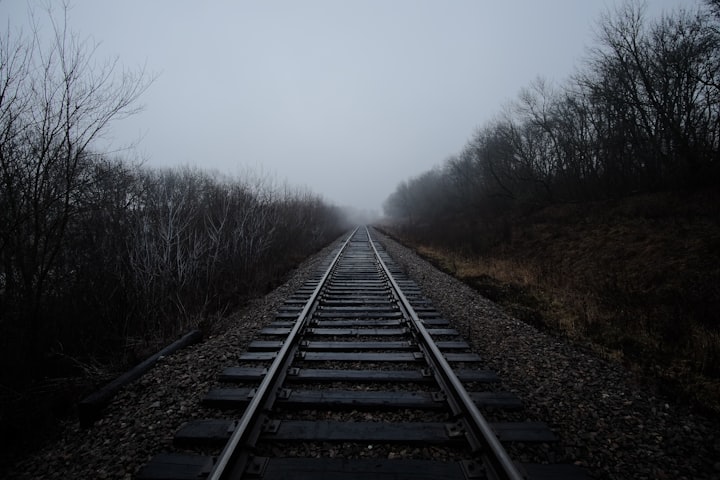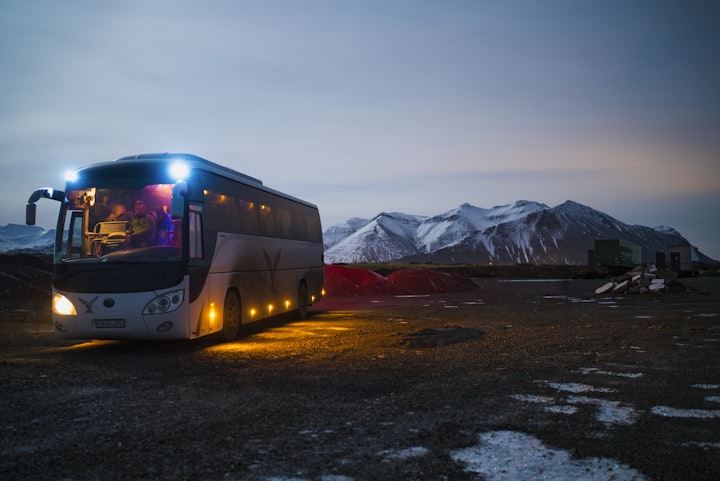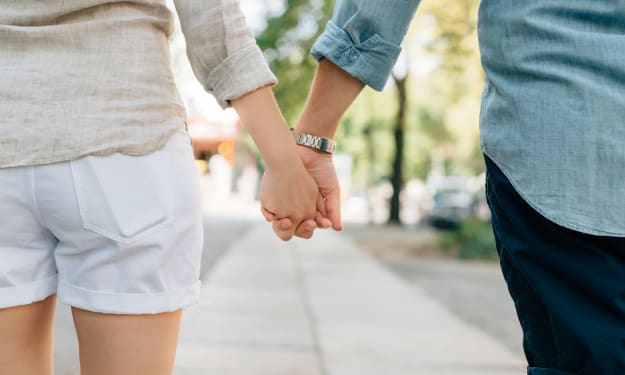Just Get There
The Start

As she sat in her father's chair by the fireplace, exhausted, Jessa stared at the heart-shaped locket and chain piled in her blood-stained palm. The gold shimmered in the late afternoon sun shining through the cabin window. She knew it was her mother's locket, but only because that is what her father told her. She has no real memories of her mother; just recycled memories from her father's stories. Now that her father was dead, the stories were all she had left of her parents and their life before the collapse. The stories and the locket. She slumped back in the chair, dropping the locket and necklace on the table next to the chair. Physically and emotionally exhausted, she drifted off to sleep, her father's final words resonating in her head.
*****
"Dad, I'm not leaving you here. I'm going back to get the sled, and I will drag you back."
"No time for that. You have to go," he said, struggling to speak.
"I'm not going without you. We are going to the settlement together."
"Sweetie, I'm not going to make it," he said as he coughed, and blood filled his mouth.
"Dad, don't talk like that." Jessa grabbed his bloody hand.
She looked around in a panic, wishing for someone, anyone, to be there to help. There was no one. Before today, she had not seen another person in almost two years. They were alone.
"The map. Use the locket to see the way," he said urgently but faintly.
"Dad, no, I am not leaving you here."
"Jessa, you don't have a choice." He paused, fighting to catch his breath. "They will be back now that they know there is a homestead close by." He stopped for a moment. "I'll always be with you Jessa. Just get there."
Jessa put her head on her father's chest. She could hear his heartbeat. Fast. Irregular. With a final cough and blood continuing to drown him, his heartbeat stopped.
*****
Jessa was startled awake by a loud, rumbling crash. She froze. She listened. No more noises. She grabbed her father's shotgun, cocked it, and went towards the door. Pulling the window curtain aside, she saw nothing. It was now dusk. She looked around on the porch. She walked down the steps and started to make her way around the cabin slowly. When she got to the back door, she saw the stacked woodpile had collapsed. She was momentarily relieved until she remembered what her father said- that they would be back. She never felt more hopeless or lonely. She looked around at the place that had been home to her and kept her and her father safe throughout the collapse and in the aftermath. Most of the majestic pines were rust-colored and dead. The fields that were once green were now brown, like everything else. The well still worked, but the stream at the back of the property was no longer pure enough to drink from. She had not seen any wildlife in about a year and had not heard the birds chirping in two. Rabies devastated the animal population, and birds were dying off before that. The homestead was dying, which is why she and her father were making the three-week journey to the settlement. She knew deep down it was time to leave. She hoped her father's stories of a place with green trees, birds singing, freshwater ponds still teeming with fish, and fields and pastures full of wildflowers were correct. It was the last shred of hope she had left.
After she went back inside, locked all the windows and doors, and lit the candles, she grabbed the two backpacks they had prepared for the journey. She wanted to combine what she could into one bag. Nuts, grains, and oats for food, plus whatever she could find along the way. A sleeping bag. Water purifying drops. A hunting knife. Ammo for the shotgun. And in her dad's bag, she found the map. It was just a plain road map, torn from a road atlas. She looked it over. Saw no highlighted path or road. No markings. No directions on how to get there or even where they were going. He told her this map was valuable and especially important. It was one of the only ones. She rotated it, flipped it over. Nothing. Then she remembered what her father said, to use the locket to see the path. She grabbed the locket, looked the whole thing over, then opened it. On the left side was a picture of her mother. One that she has seen dozens of times. The right side was just a blueish gem. She held it up to the lantern and could see through it.
"That's it!" she said out loud excitedly. "It's a looking glass!"
She grabbed the map again, and this time looked at it with the locket held up to her right eye. As if by magic, she saw the route laid out on the map. Almost at the top of the map, she saw an asterisk with the word "settlement." That is where she was heading. North. The journey would take her along rivers, next to train tracks, and even in a couple of spots, roadways. There were notes written on the map that pointed out landmarks and symbols and tips to stay hidden along the way. She folded up the map and put it and the locket in the side pocket of the bag. She set her bag and shotgun by the door and decided to hydrate and get a good night's sleep. She would start on her journey first thing in the morning. As she drifted off to sleep, she dreamt of the stories her father used to tell.
****
"Dad, can I ask you something?" said a thirteen-year-old Jessa.
"Sure, sweetie, anything at all," he replied, with openness and sincerity in his voice.
"How did things get this way? I mean, how did things fall apart? How come it is not like the stories you told me about the past, and like how it is in the books you use to teach me?"
"Hmm. That is a loaded question with an even more loaded answer. Grab that globe over there."
Jessa grabbed the globe that her dad used to teach her.
"Okay, so here is where we are," he said as he pointed to where they are on the globe. For the rest of the conversation, he was pointing out the places he was speaking of.
"This region, called the west, was in a severe drought for years. It extended throughout the Midwest. Weather patterns began to change. This caused crops to fail, and there were food shortages and famine that developed. At the same time, wildfires raged throughout this area, destroying forests, communities, farmland—everything in its path. At the same time, (pointing to Australia) wildfires were raging here (pointing to South America), and here, governments were destroying the largest area of rainforest in the world. These things caused the global temperature to rise faster than scientists predicted. In turn, melting ice packs and the arctic ice. Methane was being released into the atmosphere. Ocean levels were rising alarmingly quickly. This area, the arctic, was covered with ice. As the ice pack was melting up here, the oceans were warming around here. You with me so far?"
"I think so."
"Good, because that was just the start. See these mountains here? (Pointing to the Rocky Mountains) They were usually covered in snow and ice. The spring melting of that snow and ice fed many major rivers and tributaries. The rivers and streams dried up. Water shortages made the drought and, in turn, the wildfires worse. A series of earthquakes and volcanic eruptions in this area, called the Ring of Fire, destroyed several large cities on the west coast. Cities on the east coast were flooding from the rising sea levels. Not only coastal cities in what was the US but coastal cities around the world. At this point, billions and billions were homeless, and a billion people throughout the world had already died. Major hurricanes ravaged the east coast every spring and summer. The hurricane season became year-round. Life continued like this for a few more years. Diseases like rabies and wasting disease killed most of the wild animals. The oceans were almost empty of all life. Wars raged. Famines. Disease. Society was beginning to crumble. Governments throughout the world could not keep up with everything that was going on. Countries started collapsing. And then the lights went out. Our highways and bridges were collapsing. All communication stopped. No more internet, radio, or tv. All governing stopped. Millions were displaced, becoming nomads, looking for habitable places. We were thrown back into the dark ages. We were fine here until our area started to be affected. Everything just started dying off, including billions and billions of people. We won't be able to stay here."
"God, dad. That is awful. But the place where we are going? It's like how the earth used to be?"
"In some ways, it is. I do not think the earth will ever be what it was. There are no countries or governments anymore. Cities have been long since abandoned, and billions of people worldwide died over the course of that decade. That is why we have not seen another person in so long. But there are places, especially north of here, 300 miles or so away, up in the mountains, where the environment is still like it used to be. It's habitable. Crops can grow there; animals are safe to eat there—freshwater. Rolling green hills, and forests with those tall trees I was telling you about. Running water and electricity from panels that absorb energy from the sun. I have even heard that there is music and dancing."
"How do you know about this place?"
"An old friend of your mom told me that there was a settlement tucked away in the mountains. It was after your mom died. She was making the journey and thought you, and I should go. I just knew it was safe, and I could protect you here if we could live off the land. She left me a map in case I ever changed my mind."
He paused for a moment. Jessa noticed the change in his demeanor. More serious than before. Almost anxious.
"In a couple of years, we are going to have to make that journey."
****
The sun was brightly shining in the window, and Jessa began to wake up.
"Been a couple of years, dad," she said out loud. "Time to make that journey."
She got dressed and laced up her boots. She looked around the cabin, taking It all in before she left its safety for the last time. The curtains and blinds were all still shut, so the place was dark. She walked to the front door, opened it, and stood there for a moment, looking out into the brightness that illuminated the room. The sky was clear today, with no haze like usual. And as blue as the gemstone in the locket. Without turning back, she grabbed her bag, threw it on her shoulders, grabbed the shotgun, and pulled the door shut behind her as she walked off into the sun.
Part 2, The Beast can be found here.
About the Creator
J. Delaney-Howe
Bipolar poet. Father. Grandfather. Husband. Gay man. I write poetry, prose, some fiction and a good bit about family. Thank you for stopping by.
Queer Vocal Voices on Facebook.
Find me on Facebook.
Reader insights
Outstanding
Excellent work. Looking forward to reading more!
Top insights
Excellent storytelling
Original narrative & well developed characters
Easy to read and follow
Well-structured & engaging content
Masterful proofreading
Zero grammar & spelling mistakes






Comments (4)
This was so intense and well written! Heartbreakingly close to home with all that's going on in the world at the minute, let's hope we turn it around before this becomes our fate. Can't wait to read part two!
It's very well written, J.! For some reason, your story reminds me of The Road, a movie that really impacted me deeply.
Oh I'm glad there's a Part 2!
Moving on to #2. And with the news of the Amazon forest losing protection- all too plausible